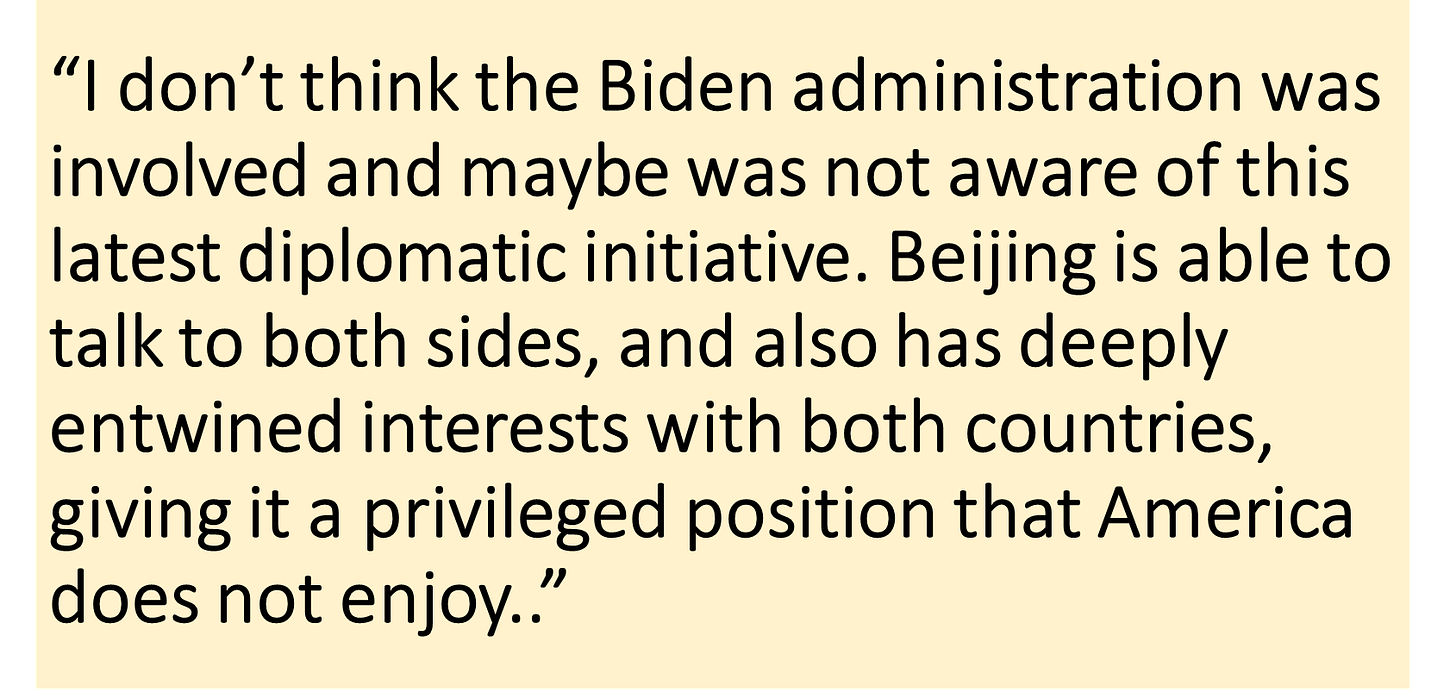Saudi-Iran Relations: Interview with Prof. Bernard Haykel
"Reaching an agreement with Iran is unlikely to affect the decisions of OPEC+ on oil production." and "We are far from seeing the flourishing of Iran’s energy sector"
Prof. Bernard Haykel is a world-renowned expert on Middle Eastern issues, especially the Gulf region, a professor of Near Eastern Studies, and Director of the Institute for Transregional Study of the Contemporary Middle East, North Africa, and Central Asia at Princeton University.
We would like to share with our readers the interview we had with Prof. Haykel on Friday, March 10, 2023, regarding Iran and Saudi Arabia's agreement to resume ties in talks brokered by China. Despite his busy schedule, he graciously agreed to answer our questions.
EOA: How can we interpret the agreement between Iran and Saudi Arabia to re-establish diplomatic relations? Does this mean that the two sides have agreed to resolve disputes, or will this agreement be the stepping stone to more talks between Riyadh and Tehran?
Prof. Haykel: This agreement has been months in the making and it has been negotiated by two of the top officials in Saudi Arabia and Iran, respectively. It represents a first step towards better relations, but only if both sides establish confidence. This will require a diminution in aggressive actions such that Iran restricts Shiite militias from attacking Saudi Arabia, and, in return, Riyadh restrains Iran International, an effective anti-regime television station sponsored by the Kingdom. For Saudi Arabia, this specifically means a halt to Huthi missile and drone attacks against the Kingdom.
What this agreement also represents is a decisive shift in Riyadh’s policies—what matters most are national strategic interests and pragmatic policies to achieve these. Certainly, the agreement also signals the rising importance of China which has brought its influence to bear on both countries. Beijing is the one power, other than Russia, that can have an impact on Tehran’s regional policies.
The Iranians have been negotiating with the Saudis for a while, asking for the reopening of the embassies and the resumption of diplomatic relations as well as obtaining hajj visas for Iranian pilgrims. The Saudis have now responded by offering concessions on all these demands, and the hajj season is not far off, so Iranians, if all goes well, will be returning to the annual pilgrimage after several years. If the Iranians reciprocate with concrete steps that reduce the security concerns of the Kingdom—remember the September 2019 Iranian attacks on Saudi oil facilities--more will be offered by Riyadh.
The other point to underscore is that the Saudi negotiator in these talks in Beijing has been Musaid al-Aiban, perhaps Saudi Arabia’s most experienced government official, with a history of negotiating with Iran going back decades. This is an important signal of the seriousness with which Saudis consider this thaw in relations to be.
The United States should welcome this agreement because any step that reduces tensions in the Middle East represents a positive step, even if Beijing is the midwife of this latest deal.
EOA: Has the success of Iran in increasing the enrichment level while the US and the EU are not enforcing sanctions played a role in this agreement? Or is this a new phase of Saudi diplomacy given the current Saudi stand on Russia and Ukraine?
Prof. Haykel: I think the recent nuclear development, namely, of Iran achieving near-bomb-grade uranium enrichment, is unrelated to this agreement. As I mentioned above, these negotiations have been months in the making, since at least last October, before President Xi’s visit to Riyadh, and this development represents a new phase in Saudi policy towards the region.
Let’s call it the zero-problems policy, which seeks to resolve tensions through negotiations and agreements rather than through belligerence and military action. In practice, this means that Riyadh is keen to end the war in Yemen and to get the Houthis to agree to this too. And in return Yemen would receive reconstruction support from the GCC.
EOA: What is Saudi Arabia seeking to achieve through re-establishing diplomatic ties with Iran?
Prof. Haykel: Saudi Arabia’s top ask of Iran is for Tehran to stop its destabilizing activities throughout the region through the mobilization and arming of violent proxies militias. These include Hezbollah in Lebanon, various Shiite militias in Syria and Iraq, and, finally, the Houthis in Yemen.
The Saudis will wait and see what Iran does after the embassies re-open. If the violence and destabilization continue, the process of maintaining diplomatic ties can be reversed. Essentially, the Saudis want to get on with the business of building and developing their own country, ideally without the distractions of turbulent politics. Inoculating themselves from the effects of Mullah’s regime is the aim. Whether this can be accomplished is anyone’s guess.
EOA: In your opinion, why did China succeed in brokering a deal between Saudi Arabia and Iran? Can we say that China is currently stepping into the void created by the waning influence of the US in the region? Or was this done with a green light from the Biden Administration?
Prof. Haykel: I don’t think the Biden administration was involved and maybe was not aware of this latest diplomatic initiative. Beijing is able to talk to both sides, and also has deeply entwined interests with both countries, giving it a privileged position that America does not enjoy. The US cannot talk directly to the Iranians, because the latter refuses all contact. Only the Chinese have the soft and commercial power to bring these two sides together. So while China doesn’t enjoy military supremacy in the Gulf, it has other advantages the US does not have. This is not to be feared nor framed in the form of a zero-sum competition between the US and China. Rather, it is better to think of each country as having a comparative advantage and complementary roles.
EOA: Do you think the agreement will lead to the normalization of relations between Saudi Arabia and the Assad regime in Syria and Hezbollah in Lebanon? What about peace with Israel?
Prof. Haykel: Riyadh might soon send its foreign minister to Damascus to acknowledge Bashar Assad’s victory by simply surviving the war. Riyadh will be keen to convince Assad to offer concessions, such as allowing displaced and refugee Syrians to return to their homes. Whether the Saudis can prevail in Damascus is anyone’s guess. Furthermore, Iran will not ease its control over Syria and Lebanon no matter what Saudi Arabia is willing to offer.
This is not a normalization of relations as much as a sad recognition of the facts on the ground. Hezbollah has an altogether different place and role when it comes to Riyadh. The movement is seen as an extension of Iran’s Revolutionary Guard Corps, and not a Lebanese political faction. As such, the way to deal with Hezbollah is through Tehran and not by engaging with Beirut. As for peace with Israel, the Saudis want to achieve this but not before the Palestinians acquire their own state. Furthermore, the Saudis will want a major set of concessions from the US for making peace with Israel. This might involve obtaining nuclear technology and materials from America as well as a set of security guarantees that only Washington DC can provide.
EOA: If this ends up a lasting agreement, what is the impact on OPEC+ and the oil market? What is the impact on energy markets? Will China develop the Iranian energy sector: oil, gas, LNG, and electricity? Will this help the Saudi civilian nuclear power program?
Prof. Haykel: Reaching an agreement with Iran is unlikely to affect the decisions of OPEC+ on oil production. Iran is not a major player in this group and can only become so if it significantly increases its production. This can only happen if the Iranian energy sector is developed through technology and major capital expenditure. As long as the US sanctions remain in place, it is unlikely that Tehran can accomplish any of this. We are far from seeing the flourishing of Iran’s energy sector, and as long as this is the case, its role in the energy group will remain marginal.
EOA: Where does Iraq fit in all of this?
Prof. Haykel: Iraq can benefit from a reduction in tensions between Saudi Arabia and Iran, but its problems are mainly domestic and related to Iran’s oversized role in its politics and economy. Those issues are unlikely to be resolved because of a Saudi-Iranian deal. The solutions lie within Iraq and these cannot be imposed by outside powers. The only possible silver lining from the agreement is that Iran might reduce its meddling in Iraq, but this is far from certain to happen.
EOA: Where does the UAE fit in all of this?
The UAE welcomes any reduction in tensions with Iran, not least because it has been the target of Iranian proxy attacks and direct Iranian threats. It would have supported this agreement, but like Riyadh, it will wait and see if the Iranians are sincere in their desire to bring peace and stability to the region.
EOA: Given the failure of previous agreements, are you optimistic that this new agreement will actually yield good results for all parties? Will certain groups that might be contained by this agreement derail it?
I am not optimistic because in the past all agreements with Iran have fallen through, and Iran thrives on instability, not prosperity as you can see from conditions in Iraq, Syria, Lebanon, and Yemen. The only difference with the present agreement is that China’s influence is being brought to bear as a mediator, which is a first, and I’m not sure whether Iran is willing to upset China by, for example, creating a situation in which security of the Gulf region is threatened.
You must remember that despite the rivalry between China and the US, both countries share similar interests in the Middle East—they want energy resources to be produced and to flow safely and reliably from the region to the rest of the world. Iran has positioned itself to hinder the flow of these hydrocarbon resources across the two principal choke points in the region, which are Hormuz and Bab al-Mandab. Iran’s support of the Huthis is fundamentally about being able to threaten maritime shipping in the Red Sea. Let’s see now that China has engaged its influence and credibility in this matter whether it will make a difference. I am skeptical that it will but I hope I’m proven wrong.
EOA: What sectors and industries will benefit the most from this agreement?
If Iran and Saudi Arabia establish friendlier relations, say the equivalent of the period when President Rafsanjani led Iran in the 1990s, then a lot of benefits can result from this. This agreement is only a first baby step in this direction. But should it lead to better relations, then Saudi Arabia can help ease the economic sanctions regime that has crippled the Iranian economy and lead to more investments to be made in the Iranian oil and gas sector. In short, a lot can be done to help Iran and to re-establish cordial and commercial relations across the Persian Gulf that will prove of benefit to all.
Ultimately, Iran has to decide whether it wishes to continue leading the so-called axis of resistance, with all the mayhem that this generates for itself and for the region, or to become a friendlier neighbor to the Arab countries on its borders and thereby benefit from the stability, security, and investments that all these will generate. At the top of the list of sectors and industries that will benefit should this agreement lead to better and warmer relations is certainly the hydrocarbon sector in Iran. This has been badly neglected and has suffered from years of underinvestment. The price of this has unfortunately been paid by the Iranian people who deserve better.








